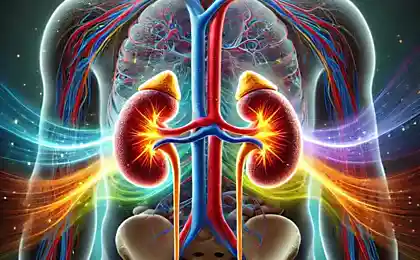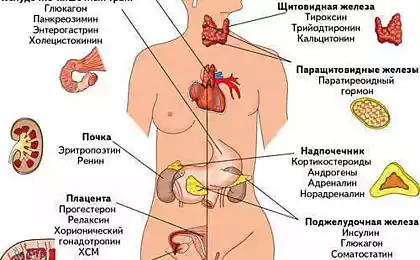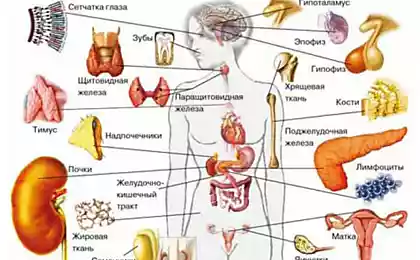363
How Everything Works: Biochemical Processes Inside Us
Our body is the finest apparatus, without a doubt – it is the most perfect biocomputer, in which many different processes occur. These processes are called biochemical processes.
Any violations in the biochemistry of our body affect mood, health, sleep. Manifestations can be the most unexpected and, often, when problems arise, coming to the doctor, you treat not their cause, but the effect. You cure, but you don't cure.
Don’t just rely on doctors, they only know what you tell them. You won’t know what’s important to talk about if you don’t figure it out, at least a little, on your own.
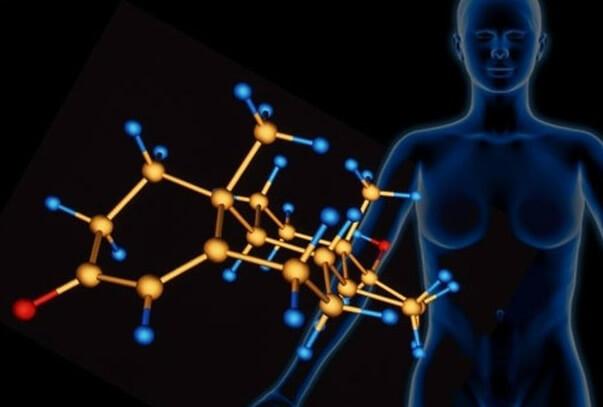
Neurotransmitters, depression and neurosis
Neurotransmitters These are types of hormones in the brain that transmit information from one neuron to another. They're synthesized by amino acids. Neurotransmitters control the body’s basic functions, including movement, emotional responses, and the physical ability to feel pleasure and pain.
The most well-known neurotransmitters affecting mood regulation are:
Neurotransmitters have the following effects on mental health:
• affect the mood and thought process;
• control the ability to concentrate and remember;
• control the appetite center in the brain;
regulate sleep.
Types of neurotransmitters
Neurotransmitters It can be roughly divided into two categories. stimulating and inhibitory. Some neurotransmitters can perform both functions.
Excitatory neurotransmitters It can be considered as "switches" of the nervous system, increasing the likelihood of transmitting an excitatory signal. They act like a car accelerator pedal, pressing which increases the number of engine turns.
Excitatory mediators control the most basic functions of the body, including: thinking processes, the fight or flight response, motor movements and higher thinking.
Physiologically excitatory neurotransmitters act as natural stimulants of the body, generally increasing vitality, activity and energy. If the inhibitory system did not act in the opposite direction, this could lead to loss of control of the body.
Braking neurotransmitters They are “switches” of the nervous system, reducing the likelihood of transmitting an excitatory signal. In the brain, excitation must be in balance with inhibition.
Too much excitement leads to anxiety, irritability, insomnia and even seizures. Braking neurotransmitters regulate the activity of excitatory neurotransmitters, acting like car brakes. The braking system slows down the processes. Physiologically inhibitory neurotransmitters act as natural tranquilizers of the body, causing drowsiness, promoting calmness and reducing aggressiveness.
Excitatory neurotransmitters
Dopamine
Histamine
Noradrenaline
Adrenaline
Glutamate
Acetylcholine
Braking neurotransmitters
GABA
Dopamine
Serotonin
Acetylcholine
Taurine
Overview of neurotransmitters
AcetylcholineImproves memory and promotes learning.
dopamineIt is mainly responsible for sexual desire, mood, liveliness and movement.
norepinephrine and adrenaline affect liveliness, excitement and mood.
serotoninIt affects mood, appetite, emotional balance and motivation management.
GABAIt helps to relax and calm down.
Acetylcholine
The release of acetylcholine can have an excitatory or inhibitory effect depending on the type of tissue and the nature of the receptor with which it interacts. Acetylcholine plays many different roles in the nervous system. Its main action is to stimulate the skeletal muscular system. It is this neurotransmitter that causes conscious muscle contraction or relaxation.
In the brain, acetylcholine affects memory and learning ability. Acetylcholine has a small molecular weight. It is also found in the hippocampus and in the prefrontal cortex of the brain. The hippocampus is responsible for remembering and retrieving remembered information. Alzheimer’s disease is associated with a lack of acetylcholine in certain areas of the brain.
dopamine
Dopamine can act as both an excitatory and inhibitory neurotransmitter. In the brain, it acts as a neurotransmitter responsible for good mood. It is part of the brain’s reward system and causes feelings of satisfaction or pleasure when we do things we enjoy, such as eating or having sex.
Drugs such as cocaine, nicotine, opiates, heroin and alcohol increase dopamine levels. Delicious food and sex also increase dopamine levels. For this reason, many researchers believe that the tendency of some people to smoke, use drugs and alcohol, promiscuity in choosing sexual partners, gambling and overeating is a deficiency of dopamine in the brain.
Dopamine performs a variety of functions that affect memory, motor control and pleasure. Thanks to him, we can show vitality, be motivated and feel satisfied. Dopamine is associated with states of positive stress, such as falling in love, exercising, listening to music, and sex. After synthesis, dopamine can be sequentially converted into other neurotransmitters of the brain - norepinephrine and adrenaline.
High level.
However, too much of something good can also be bad. Elevated levels of dopamine in the frontal segment of the brain lead to inconsistent and interrupted thought processes characteristic of schizophrenia. If the environment causes hyperstimulation, excessively high levels of dopamine lead to arousal and increased energy, which then change to suspicion and paranoia. When dopamine levels are too low, we lose our ability to concentrate. When it is too high, the concentration becomes narrowed and intense. High levels of dopamine are observed in patients with insufficient gastrointestinal function, autism, sudden changes in mood, aggressiveness, psychosis, fear neurosis, hyperactivity, as well as in children with attention disorders.
Low level.
Too low levels of dopamine in the motor areas of the brain cause Parkinson’s disease, leading to uncontrolled muscle tremors. Decreased levels of dopamine in areas of the brain responsible for thinking processes are associated with cognitive problems (poor memory and insufficient learning ability), insufficient concentration, difficulty in initializing or completing various tasks, insufficient ability to concentrate on tasks and talking with the interlocutor, lack of energy, motivation, inability to enjoy life, bad habits and desires, obsessions, lack of pleasure from activities that were previously pleasant, as well as slow motor movements.
adrenaline
Adrenaline is an excitatory neurotransmitter. It is formed from norepinephrine and is excreted along with norepinephrine in response to fear or anger. This reaction, known as the “flight or fight response,” prepares the body for strenuous activity. Adrenaline regulates mindfulness, arousal, cognitive processes, sexual arousal and concentration of thinking processes. It is also responsible for regulating metabolism. In medicine, adrenaline is used as a stimulant for cardiac arrest, a means for narrowing blood vessels in shock, antispasmodic and bronchodilator for bronchial asthma and anaphylaxis.
High level.
Too high adrenaline levels lead to anxiety, fear, sleep problems, acute stress, and attention deficit hyperactivity disorder. Excess adrenaline can also cause irritability, insomnia, increased blood pressure and increased pulse rate.
Low level.
Low levels of adrenaline, among other things, contribute to weight gain, fatigue, poor concentration and reduced sexual arousal.
Stress contributes to the depletion of adrenaline stores in the body, and physical activity contributes to their increase.
GABA (GABA)
GABA is an abbreviated name for gamma-aminobutyric acid. GABA is an important inhibitory neurotransmitter of the central nervous system, playing a significant role in regulating fear and anxiety and reducing the effects of stress. GABA has a calming effect on the brain and helps the brain filter out “extraneous noise.” It improves concentration and calms the nerves. GABA acts as a brake on excitatory neurotransmitters, which can cause fear and anxiety when overstimulated. It regulates the action of norepinephrine, adrenaline, dopamine and serotonin, and is also an important mood modulator. The primary function of GABA is to prevent excessive stimulation.
High level.
Excessive amounts of GABA lead to excessive relaxation and soothing – to a level where it negatively affects normal reactions.
Low level.
Insufficient amounts of GABA lead to excessive brain stimulation. People with GABA deficiency are prone to neurosis and may be prone to alcoholism. Low GABA levels are also associated with bipolar disorder, mania, lack of impulse control, epilepsy, and seizures. Because proper functioning of GABA is necessary to promote relaxation, analgesia, and sleep, dysfunction of the GABA system is associated with the pathophysiology of several neuropsychiatric disorders, such as fear psychosis and depression. A 1990 study found a link between low levels of GABA and alcoholism. When study participants whose fathers suffered from alcoholism drank a glass of vodka, their GABA levels rose to the values observed in study participants from the control group.
glutamate
Glutamate is an important excitatory neurotransmitter associated with learning processes and memory. It is also thought to be associated with Alzheimer’s disease. The glutamate molecule is one of the main processes of cellular metabolism. Glutamate has been found to play a role in epileptic seizures. It is also one of the main food components that creates taste. Glutamate is found in all kinds of foods containing proteins, such as cheese, milk, mushrooms, meat, fish and many vegetables. Sodium glutamate is a salt of sodium glutamic acid.
High level.
Excess glutamate is toxic to neurons and causes neurological disorders such as amyotrophic lateral sclerosis, Huntington’s disease, peripheral neuropathies, chronic pain, schizophrenia, stroke and Parkinson’s disease.
Low level.
Insufficient amounts of glutamate may play a role in impaired memory and learning ability.
histamine
Histamine is best known for its role in allergic reactions. It also plays a role in the transmission of nerve impulses and can influence a person’s emotions and behavior. Histamine helps manage the sleep-wake cycle and promotes the release of epinephrine and norepinephrine.
High level.
High histamine levels have been linked to obsessive manic states, depression and headaches.
Low level.
Low levels of histamine can contribute to the development of paranoia, low libido, fatigue, sensitivity to drugs.
Monoamine
This class of neurotransmitters includes serotonin, norepinephrine, GABA, glutamate, and dopamine. According to the so-called monoamine hypothesis, mood disorders are caused by the depletion of stores of one or more of these neurotransmitters.
norepinephrine
Norepinephrine is an excitatory neurotransmitter that plays an important role in concentration. Norepinephrine is synthesized from dopamine and plays an important role in the nervous system in the fight-or-flight response. Norepinephrine initiates the release of hormones in the limbic segment of the brain, which signal other stress hormones to act in a crisis situation. It can increase blood pressure and pulse rate, as well as speed up metabolism, increase body temperature and stimulate the smooth muscles of the bronchi to promote breathing. Norepinephrine plays an important role in remembering.
High level.
Elevated amounts of norepinephrine appear to contribute to a state of fear and anxiety. Under stress, the circulation of norepinephrine in the brain increases.
An increase in the level of norepinephrine leads to increased liveliness, increases mood and sexual desire. However, a large amount of norepinephrine increases blood pressure, pulse rate, causes hyperactivity, feelings of fear, anxiety, panic and stress, overwhelming fear, irritability and insomnia.
Low level.
Low levels of norepinephrine are associated with a lack of energy, concentration and motivation. Norepinephrine deficiency also contributes to depression, lack of vitality and poor memory.
phenethylamine
Phenethylamine is an excitatory neurotransmitter synthesized from phenylamine. It plays an important role in concentration.
High level.
Elevated levels of phenethylamine are observed in people with manic tendencies, sleep disorders and schizophrenia.
Low level.
Low levels of phenethylamine are associated with problems of attention and clear thinking, as well as depression.
serotonin
Serotonin is an inhibitory neurotransmitter involved in regulating mood, feelings of anxiety, libido, obsession, headaches, body temperature, appetite disorders, social disorders, phobias, sleep, memory and learning processes, cardiovascular function, muscle contraction, and endocrine regulation. However, serotonin usually has different effects.
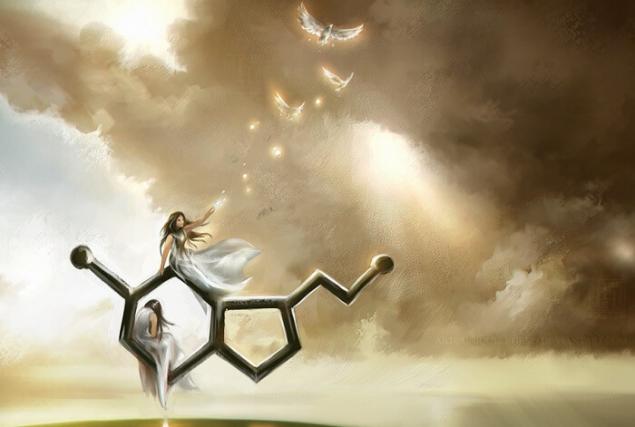
Serotonin plays an important role in regulating sleep and mood. The appropriate amount of circulating serotonin promotes relaxation. Stress reduces the amount of serotonin as the body uses its stores to calm down.
Low level.
Low levels of serotonin can lead to depressive mood, anxiety, low energy, migraine, sleep disorders, obsessive or manic states, feelings of tension and irritation, cravings for sweets or loss of appetite, deterioration of memory and concentration, angry and aggressive behavior, slowed muscle movement, slowed speech, changing the time of falling asleep and waking up, decreased interest in sex.
High level.
Excess serotonin causes calm, decreased sexual arousal, a sense of well-being, bliss, and a sense of fusion with the universe. However, if serotonin levels become too high, it can lead to the development of serotonin syndrome, which can be fatal.
Serotonin syndrome
Extremely high levels of serotonin can be toxic and even fatal, causing a condition known as "serotonin syndrome." It is very difficult to achieve such levels with an overdose of only one antidepressant, but there are cases when this condition occurs with a combination of various drugs that cause an increase in serotonin levels, for example, antidepressants of the SSRI and MAOI classes.
The use of ecstasy also causes similar manifestations, but rarely leads to toxicity. Serotonin syndrome causes severe tremors, excessive sweating, insomnia, nausea, tooth tremors, chills, cold tremors, aggressiveness, self-confidence, agitation and malignant hyperthermia. It requires emergency medical attention using drugs that neutralize or block the action of serotonin.
Factors Affecting Serotonin Production
Levels of various hormones, including estrogen, can affect the amount of serotonin. This explains the fact that some women in the premenstrual period, as well as in menopause, have problems with mood. In addition, daily stress can significantly reduce the body’s serotonin stores.
Exercise and good lighting help stimulate the synthesis of serotonin and increase its amount. Antidepressants also help the brain restore its serotonin stores. Recently, antidepressants of the SSRI class (selective serotonin uptake inhibitors, selective serotonin uptake inhibitors) have been used to increase the amount of serotonin.
Hormones – the chemical aspect of behavior
How Stress Affects Your Hormones
taurine
Taurine is an inhibitory neurotransmitter with neuromodulatory and neuroprotective effects. Taking taurine can enhance GABA function, so taurine is an important neuromodulator in preventing feelings of fear and anxiety. The purpose of this enhancement of GABA function is to prevent excessive stimulation due to the increased content of excitatory amines such as epinephrine and norepinephrine. Thus, taurine and GABA form a mechanism that protects against excessive amounts of excitatory neurotransmitters. published
Source: www.childneurologyinfo.com/health-text-biochem1.php
Any violations in the biochemistry of our body affect mood, health, sleep. Manifestations can be the most unexpected and, often, when problems arise, coming to the doctor, you treat not their cause, but the effect. You cure, but you don't cure.
Don’t just rely on doctors, they only know what you tell them. You won’t know what’s important to talk about if you don’t figure it out, at least a little, on your own.

Neurotransmitters, depression and neurosis
Neurotransmitters These are types of hormones in the brain that transmit information from one neuron to another. They're synthesized by amino acids. Neurotransmitters control the body’s basic functions, including movement, emotional responses, and the physical ability to feel pleasure and pain.
The most well-known neurotransmitters affecting mood regulation are:
- serotonin,
- norepinephrine,
- dopamine
- acetylcholine,
- GABA.
Neurotransmitters have the following effects on mental health:
• affect the mood and thought process;
• control the ability to concentrate and remember;
• control the appetite center in the brain;
regulate sleep.
Types of neurotransmitters
Neurotransmitters It can be roughly divided into two categories. stimulating and inhibitory. Some neurotransmitters can perform both functions.
Excitatory neurotransmitters It can be considered as "switches" of the nervous system, increasing the likelihood of transmitting an excitatory signal. They act like a car accelerator pedal, pressing which increases the number of engine turns.
Excitatory mediators control the most basic functions of the body, including: thinking processes, the fight or flight response, motor movements and higher thinking.
Physiologically excitatory neurotransmitters act as natural stimulants of the body, generally increasing vitality, activity and energy. If the inhibitory system did not act in the opposite direction, this could lead to loss of control of the body.
Braking neurotransmitters They are “switches” of the nervous system, reducing the likelihood of transmitting an excitatory signal. In the brain, excitation must be in balance with inhibition.
Too much excitement leads to anxiety, irritability, insomnia and even seizures. Braking neurotransmitters regulate the activity of excitatory neurotransmitters, acting like car brakes. The braking system slows down the processes. Physiologically inhibitory neurotransmitters act as natural tranquilizers of the body, causing drowsiness, promoting calmness and reducing aggressiveness.
Excitatory neurotransmitters
Dopamine
Histamine
Noradrenaline
Adrenaline
Glutamate
Acetylcholine
Braking neurotransmitters
GABA
Dopamine
Serotonin
Acetylcholine
Taurine
Overview of neurotransmitters
AcetylcholineImproves memory and promotes learning.
dopamineIt is mainly responsible for sexual desire, mood, liveliness and movement.
norepinephrine and adrenaline affect liveliness, excitement and mood.
serotoninIt affects mood, appetite, emotional balance and motivation management.
GABAIt helps to relax and calm down.
Acetylcholine
The release of acetylcholine can have an excitatory or inhibitory effect depending on the type of tissue and the nature of the receptor with which it interacts. Acetylcholine plays many different roles in the nervous system. Its main action is to stimulate the skeletal muscular system. It is this neurotransmitter that causes conscious muscle contraction or relaxation.
In the brain, acetylcholine affects memory and learning ability. Acetylcholine has a small molecular weight. It is also found in the hippocampus and in the prefrontal cortex of the brain. The hippocampus is responsible for remembering and retrieving remembered information. Alzheimer’s disease is associated with a lack of acetylcholine in certain areas of the brain.
dopamine
Dopamine can act as both an excitatory and inhibitory neurotransmitter. In the brain, it acts as a neurotransmitter responsible for good mood. It is part of the brain’s reward system and causes feelings of satisfaction or pleasure when we do things we enjoy, such as eating or having sex.
Drugs such as cocaine, nicotine, opiates, heroin and alcohol increase dopamine levels. Delicious food and sex also increase dopamine levels. For this reason, many researchers believe that the tendency of some people to smoke, use drugs and alcohol, promiscuity in choosing sexual partners, gambling and overeating is a deficiency of dopamine in the brain.
Dopamine performs a variety of functions that affect memory, motor control and pleasure. Thanks to him, we can show vitality, be motivated and feel satisfied. Dopamine is associated with states of positive stress, such as falling in love, exercising, listening to music, and sex. After synthesis, dopamine can be sequentially converted into other neurotransmitters of the brain - norepinephrine and adrenaline.
High level.
However, too much of something good can also be bad. Elevated levels of dopamine in the frontal segment of the brain lead to inconsistent and interrupted thought processes characteristic of schizophrenia. If the environment causes hyperstimulation, excessively high levels of dopamine lead to arousal and increased energy, which then change to suspicion and paranoia. When dopamine levels are too low, we lose our ability to concentrate. When it is too high, the concentration becomes narrowed and intense. High levels of dopamine are observed in patients with insufficient gastrointestinal function, autism, sudden changes in mood, aggressiveness, psychosis, fear neurosis, hyperactivity, as well as in children with attention disorders.
Low level.
Too low levels of dopamine in the motor areas of the brain cause Parkinson’s disease, leading to uncontrolled muscle tremors. Decreased levels of dopamine in areas of the brain responsible for thinking processes are associated with cognitive problems (poor memory and insufficient learning ability), insufficient concentration, difficulty in initializing or completing various tasks, insufficient ability to concentrate on tasks and talking with the interlocutor, lack of energy, motivation, inability to enjoy life, bad habits and desires, obsessions, lack of pleasure from activities that were previously pleasant, as well as slow motor movements.
adrenaline
Adrenaline is an excitatory neurotransmitter. It is formed from norepinephrine and is excreted along with norepinephrine in response to fear or anger. This reaction, known as the “flight or fight response,” prepares the body for strenuous activity. Adrenaline regulates mindfulness, arousal, cognitive processes, sexual arousal and concentration of thinking processes. It is also responsible for regulating metabolism. In medicine, adrenaline is used as a stimulant for cardiac arrest, a means for narrowing blood vessels in shock, antispasmodic and bronchodilator for bronchial asthma and anaphylaxis.
High level.
Too high adrenaline levels lead to anxiety, fear, sleep problems, acute stress, and attention deficit hyperactivity disorder. Excess adrenaline can also cause irritability, insomnia, increased blood pressure and increased pulse rate.
Low level.
Low levels of adrenaline, among other things, contribute to weight gain, fatigue, poor concentration and reduced sexual arousal.
Stress contributes to the depletion of adrenaline stores in the body, and physical activity contributes to their increase.
GABA (GABA)
GABA is an abbreviated name for gamma-aminobutyric acid. GABA is an important inhibitory neurotransmitter of the central nervous system, playing a significant role in regulating fear and anxiety and reducing the effects of stress. GABA has a calming effect on the brain and helps the brain filter out “extraneous noise.” It improves concentration and calms the nerves. GABA acts as a brake on excitatory neurotransmitters, which can cause fear and anxiety when overstimulated. It regulates the action of norepinephrine, adrenaline, dopamine and serotonin, and is also an important mood modulator. The primary function of GABA is to prevent excessive stimulation.
High level.
Excessive amounts of GABA lead to excessive relaxation and soothing – to a level where it negatively affects normal reactions.
Low level.
Insufficient amounts of GABA lead to excessive brain stimulation. People with GABA deficiency are prone to neurosis and may be prone to alcoholism. Low GABA levels are also associated with bipolar disorder, mania, lack of impulse control, epilepsy, and seizures. Because proper functioning of GABA is necessary to promote relaxation, analgesia, and sleep, dysfunction of the GABA system is associated with the pathophysiology of several neuropsychiatric disorders, such as fear psychosis and depression. A 1990 study found a link between low levels of GABA and alcoholism. When study participants whose fathers suffered from alcoholism drank a glass of vodka, their GABA levels rose to the values observed in study participants from the control group.
glutamate
Glutamate is an important excitatory neurotransmitter associated with learning processes and memory. It is also thought to be associated with Alzheimer’s disease. The glutamate molecule is one of the main processes of cellular metabolism. Glutamate has been found to play a role in epileptic seizures. It is also one of the main food components that creates taste. Glutamate is found in all kinds of foods containing proteins, such as cheese, milk, mushrooms, meat, fish and many vegetables. Sodium glutamate is a salt of sodium glutamic acid.
High level.
Excess glutamate is toxic to neurons and causes neurological disorders such as amyotrophic lateral sclerosis, Huntington’s disease, peripheral neuropathies, chronic pain, schizophrenia, stroke and Parkinson’s disease.
Low level.
Insufficient amounts of glutamate may play a role in impaired memory and learning ability.
histamine
Histamine is best known for its role in allergic reactions. It also plays a role in the transmission of nerve impulses and can influence a person’s emotions and behavior. Histamine helps manage the sleep-wake cycle and promotes the release of epinephrine and norepinephrine.
High level.
High histamine levels have been linked to obsessive manic states, depression and headaches.
Low level.
Low levels of histamine can contribute to the development of paranoia, low libido, fatigue, sensitivity to drugs.
Monoamine
This class of neurotransmitters includes serotonin, norepinephrine, GABA, glutamate, and dopamine. According to the so-called monoamine hypothesis, mood disorders are caused by the depletion of stores of one or more of these neurotransmitters.
norepinephrine
Norepinephrine is an excitatory neurotransmitter that plays an important role in concentration. Norepinephrine is synthesized from dopamine and plays an important role in the nervous system in the fight-or-flight response. Norepinephrine initiates the release of hormones in the limbic segment of the brain, which signal other stress hormones to act in a crisis situation. It can increase blood pressure and pulse rate, as well as speed up metabolism, increase body temperature and stimulate the smooth muscles of the bronchi to promote breathing. Norepinephrine plays an important role in remembering.
High level.
Elevated amounts of norepinephrine appear to contribute to a state of fear and anxiety. Under stress, the circulation of norepinephrine in the brain increases.
An increase in the level of norepinephrine leads to increased liveliness, increases mood and sexual desire. However, a large amount of norepinephrine increases blood pressure, pulse rate, causes hyperactivity, feelings of fear, anxiety, panic and stress, overwhelming fear, irritability and insomnia.
Low level.
Low levels of norepinephrine are associated with a lack of energy, concentration and motivation. Norepinephrine deficiency also contributes to depression, lack of vitality and poor memory.
phenethylamine
Phenethylamine is an excitatory neurotransmitter synthesized from phenylamine. It plays an important role in concentration.
High level.
Elevated levels of phenethylamine are observed in people with manic tendencies, sleep disorders and schizophrenia.
Low level.
Low levels of phenethylamine are associated with problems of attention and clear thinking, as well as depression.
serotonin
Serotonin is an inhibitory neurotransmitter involved in regulating mood, feelings of anxiety, libido, obsession, headaches, body temperature, appetite disorders, social disorders, phobias, sleep, memory and learning processes, cardiovascular function, muscle contraction, and endocrine regulation. However, serotonin usually has different effects.

Serotonin plays an important role in regulating sleep and mood. The appropriate amount of circulating serotonin promotes relaxation. Stress reduces the amount of serotonin as the body uses its stores to calm down.
Low level.
Low levels of serotonin can lead to depressive mood, anxiety, low energy, migraine, sleep disorders, obsessive or manic states, feelings of tension and irritation, cravings for sweets or loss of appetite, deterioration of memory and concentration, angry and aggressive behavior, slowed muscle movement, slowed speech, changing the time of falling asleep and waking up, decreased interest in sex.
High level.
Excess serotonin causes calm, decreased sexual arousal, a sense of well-being, bliss, and a sense of fusion with the universe. However, if serotonin levels become too high, it can lead to the development of serotonin syndrome, which can be fatal.
Serotonin syndrome
Extremely high levels of serotonin can be toxic and even fatal, causing a condition known as "serotonin syndrome." It is very difficult to achieve such levels with an overdose of only one antidepressant, but there are cases when this condition occurs with a combination of various drugs that cause an increase in serotonin levels, for example, antidepressants of the SSRI and MAOI classes.
The use of ecstasy also causes similar manifestations, but rarely leads to toxicity. Serotonin syndrome causes severe tremors, excessive sweating, insomnia, nausea, tooth tremors, chills, cold tremors, aggressiveness, self-confidence, agitation and malignant hyperthermia. It requires emergency medical attention using drugs that neutralize or block the action of serotonin.
Factors Affecting Serotonin Production
Levels of various hormones, including estrogen, can affect the amount of serotonin. This explains the fact that some women in the premenstrual period, as well as in menopause, have problems with mood. In addition, daily stress can significantly reduce the body’s serotonin stores.
Exercise and good lighting help stimulate the synthesis of serotonin and increase its amount. Antidepressants also help the brain restore its serotonin stores. Recently, antidepressants of the SSRI class (selective serotonin uptake inhibitors, selective serotonin uptake inhibitors) have been used to increase the amount of serotonin.
Hormones – the chemical aspect of behavior
How Stress Affects Your Hormones
taurine
Taurine is an inhibitory neurotransmitter with neuromodulatory and neuroprotective effects. Taking taurine can enhance GABA function, so taurine is an important neuromodulator in preventing feelings of fear and anxiety. The purpose of this enhancement of GABA function is to prevent excessive stimulation due to the increased content of excitatory amines such as epinephrine and norepinephrine. Thus, taurine and GABA form a mechanism that protects against excessive amounts of excitatory neurotransmitters. published
Source: www.childneurologyinfo.com/health-text-biochem1.php







